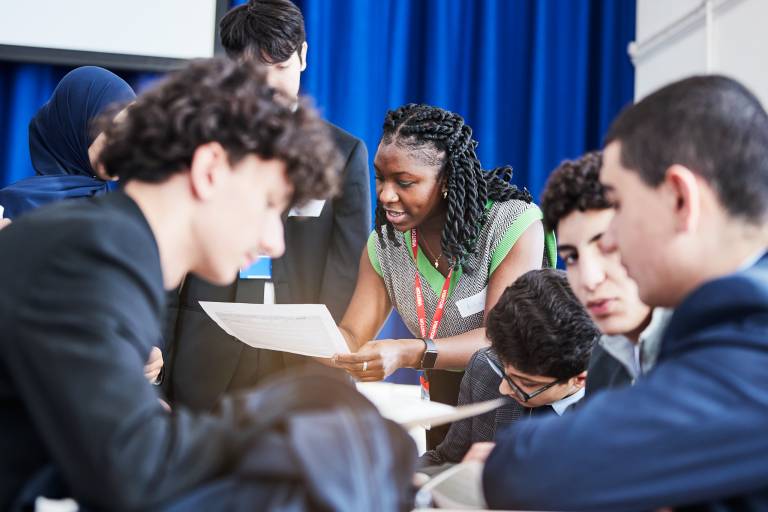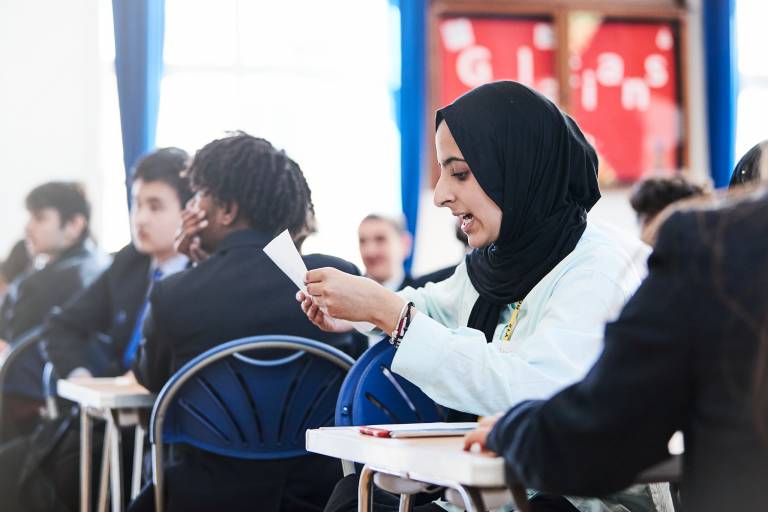‘Change the Narrative’ workshop for Black History Month.
27 October 2022
STS staff Jenny Bulstrode and PhD student Rokia Ballo teamed up with the Access and Widening Participation Office to work with a non-selective, high proportion free school meals and special needs school in London on the ‘Change the Narrative’ workshop for Black History Month.

In 2021, The Royal Society released a statement reporting that the STEM sector must step up to end the unacceptable inequalities in Black staff and students’ academic progression and success (Royal Society, 2021). Later that same year, the Runnymede Trust reported on what actions make movements effective in achieving real world change. The first finding of the report was that successful movements ‘shift the debate’ by telling compelling stories that speak to people’s values and identities, capture existing narratives and build alternatives (Runnymede, 2021). Motivated by this, Dr Jenny Bulstrode and PhD candidate Rokia Ballo from the UCL Department of Science and Technology Studies (STS) teamed up with the Access and Widening Participation Office (AWPO) to work with a non-selective, high proportion free school meals and special needs school in London on the ‘Change the Narrative’ workshop for Black History Month.
Rokia's research explores the relationship between science advice for policy and social inequalities in the UK. She is co-chair of Science London, a voluntary organisation committed to embedding equitable practice in science communication, and is currently part of a steering committee developing Natural History Museum events to support young people from Black and minority ethnic backgrounds to reconnect with nature and climate and environmental justice. Jenny's work combines archival research with oral traditions, tacit skills and material science to foreground and centre histories of marginalised sciences, most recently in her work on the debt of the British industrial revolution to a major innovation in 18th century metallurgy by Black Jamaicans under British enslavement.
The 'Change the Narrative' workshop brought together Rokia’s expertise in equity and public engagement with Jenny’s historical research, and the knowledge and lived experience of the students in the room. Thanks to an AWPO Bespoke Project grant, the workshop was able to engage the invaluable support of STS undergraduate Student Ambassador, Andréa Lekare, and AWPO Senior Access Officer, Lauren Gillett. Led by Rokia, the session began by introducing the students to UCL STS through an interactive mission-based game, based on Jenny’s historical research on Black innovation in Jamaica, and the continuities in present day STEM. Rokia then developed whole-group discussion of the current landscape and experiences of Black researchers, signposting organisations and individuals who are working to change the narrative for and about Black people in STEM and reflecting on her own experiences as a researcher. Students were given time to carry out their own mini research project around a Black innovator in STEM and present findings to their peers. The session then culminated with vibrant discussion of how the students’ presentations link to what we do in the STS department and the kinds of careers UCL STS graduates go on to develop.

The response from the students was a real testament to the importance of this work. Several described the content as ‘eye opening’. Others described how they particularly enjoyed the ‘chance to speak [their] mind’; to ‘engage in oral history’; to see their own ‘subconscious prejudice’ against their own place in STEM; to ‘research for ourselves’; and the ‘freedom to express our knowledge’. When asked if they felt they had gained anything from the workshop, students responded with comments such as: ‘A greater understanding of innovation’; ‘An insight into the truth behind narratives about innovation’; ‘Historical facts and issues that affect the bigger picture beyond the surface of STEM education’; ‘Insight into the historical aspect of science and how it has affected innovation in STEM’; ‘A different view in modern day science’; and ‘A new way of thinking’. Further comments were extremely positive with students sayind that they particularly enjoyed the interaction during the session and that they found the workshop enlightening and insightful 'and vital to gain more knowledge into the importance of different Black people’. Asked if they would like to come to UCL for a follow-up session, 74% responded ‘strongly agree’, and 88.9% responded ‘agree’ or ‘strongly agree’. Only three responses were neutral and no responses were negative.
Following the event, the school contacted the workshop team to say that ‘students have been talking about it all week!' and they would welcome the opportunity to continue the partnership for as long as possible as 'it makes such a difference to students’.
Thanks to the AWPO Bespoke Project grant, STS is looking forward to running a follow-up event at UCL with the students in the New Year. The Department is extremely thankful to the AWPO team and STS colleagues, as well as to the school staff and students who made this important workshop possible.
 Close
Close

